Polyurethane casters, indispensable in modern industry and daily life, stand out for their excellent physical and mechanical properties, playing a significant role in numerous fields. This article aims to delve deeply into the material characteristics, advantages, potential drawbacks, and extensive application scenarios of polyurethane casters, providing a comprehensive and in-depth understanding for readers.

Material and Characteristics of Polyurethane Casters
البولي يوريثين (PU), a high-molecular polymer, is renowned for its exceptional oil resistance, wear resistance, aging resistance, and chemical resistance. It combines the elasticity of rubber with the hardness of plastic. Additionally, it has a lower density yet high strength and hardness, making PU wheels a material that embodies multiple advantages. Its unique molecular structure endows polyurethane casters with the following notable characteristics:
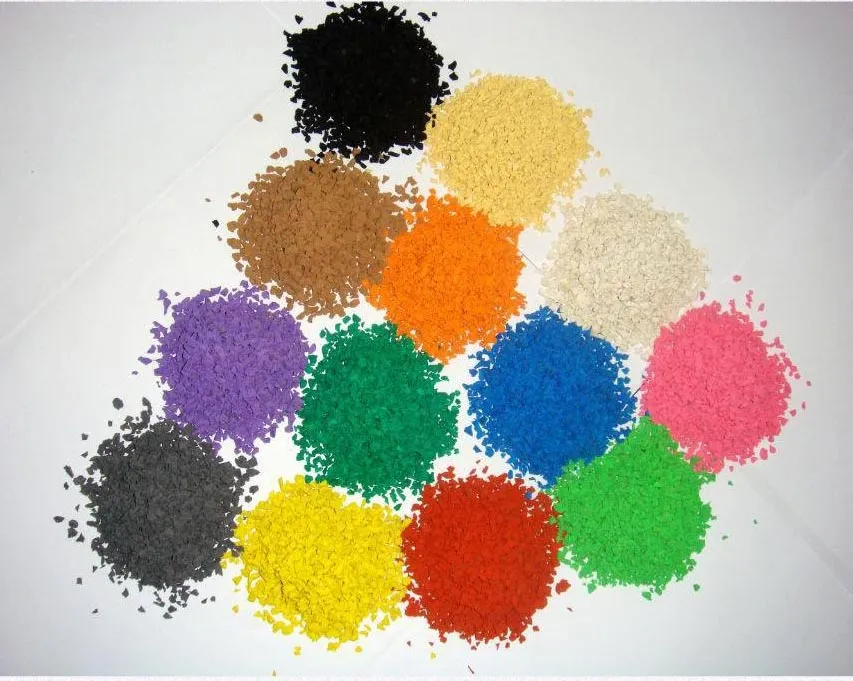
– Lightweight yet Strong: Compared to PVC wheels, PU wheels are lighter, making them easier to maneuver and move while maintaining the necessary strength and durability.
– Wear Resistance: The linear molecular structure of PU material gives its surface smoothness and excellent self-lubricating properties, thereby enhancing wear resistance.
– Slip Resistance and Noise Reduction: The good self-lubricating and non-stick nature of PU wheels allows for smoother usage and has outstanding noise reduction and shock absorption effects.
– Longevity and Environmental Friendliness: PU wheels have a normal lifespan of 3-5 years and the material is environmentally friendly, non-toxic, and recyclable.
Advantages of Pu Caster Wheel
Polyurethane casters not only excel in material quality but also exhibit numerous advantages in practical applications:
– Wear Resistance and Impact Resistance: The unique molecular structure of polyurethane makes it excel in resisting wear and impact, extending the caster’s lifespan and reducing maintenance costs.
– Low Rolling Resistance: Facilitates easier movement of equipment, reducing energy consumption and wear and tear on the equipment.
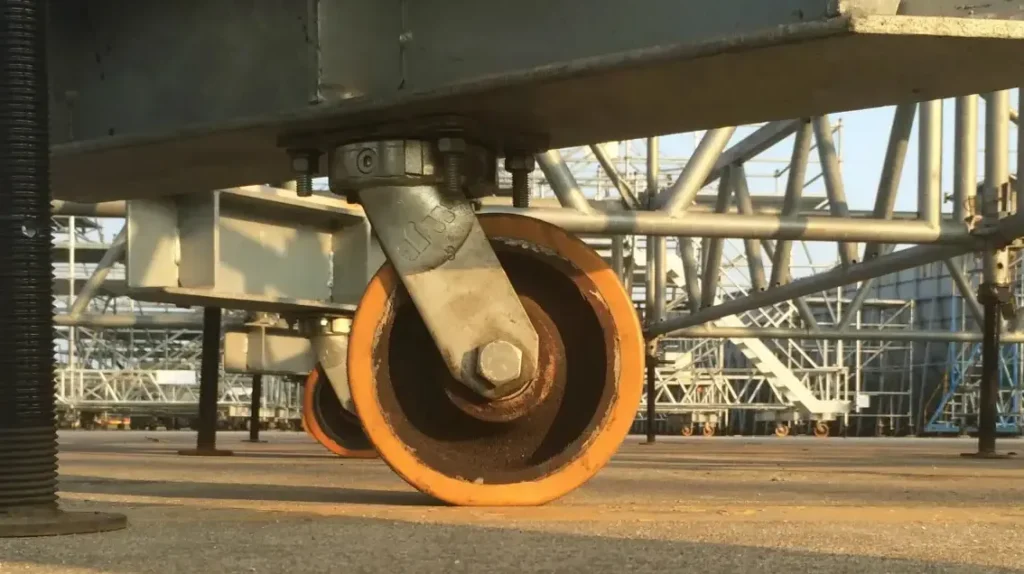
– Corrosion Resistance and Chemical Stability: Maintains performance and durability in environments with exposure to various chemicals.
– Versatile Application: Suitable for everything from light office chairs to heavy industrial equipment, adapting to different loads, speeds, and environmental conditions.
Potential Drawbacks
Despite the many advantages of polyurethane casters, there are potential drawbacks under specific conditions:
– Prone to Deformation: May change shape under prolonged heavy pressure or extreme temperatures.
– Poor High-Temperature Resistance: Not suitable for high-temperature environments, which may lead to a decline in material performance.
– Limited Impact Resistance: Although it has a certain degree of impact resistance, it may not withstand extreme impacts.
Application Scenarios of Polyurethane Casters
With the aforementioned characteristics, polyurethane casters have a wide range of applications, covering industries, commerce, and households:
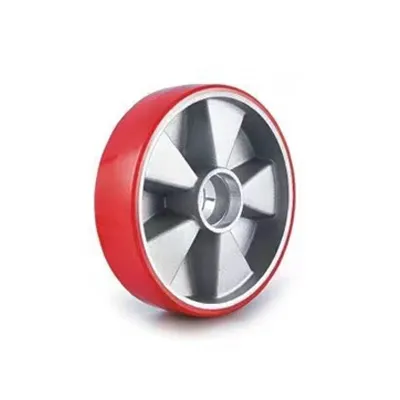
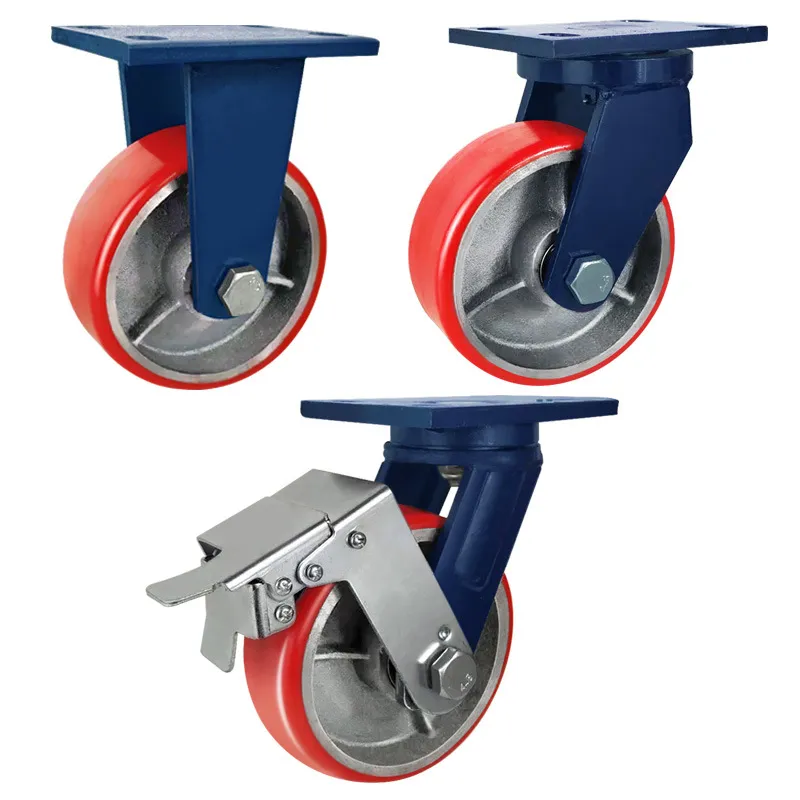
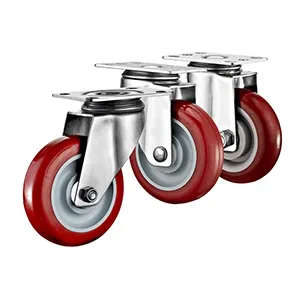
– Industrial Applications: Widely used in refrigeration equipment, عربات, and heavy machinery due to their wear resistance, chemical resistance, and high سعة التحميل. In industrial equipment like heavy transport vehicles, pallet Jack, and handling cars, polyurethane casters are favored for their high load-bearing capacity and wear resistance.
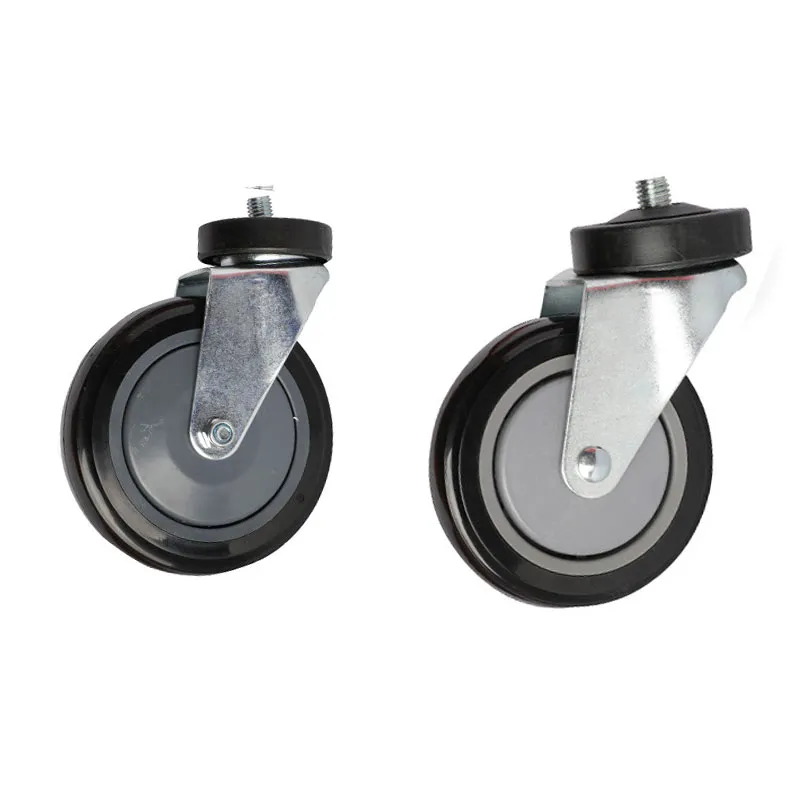
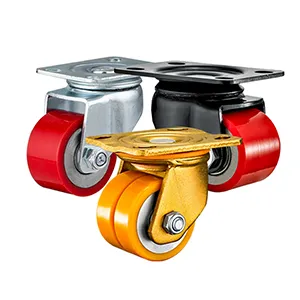
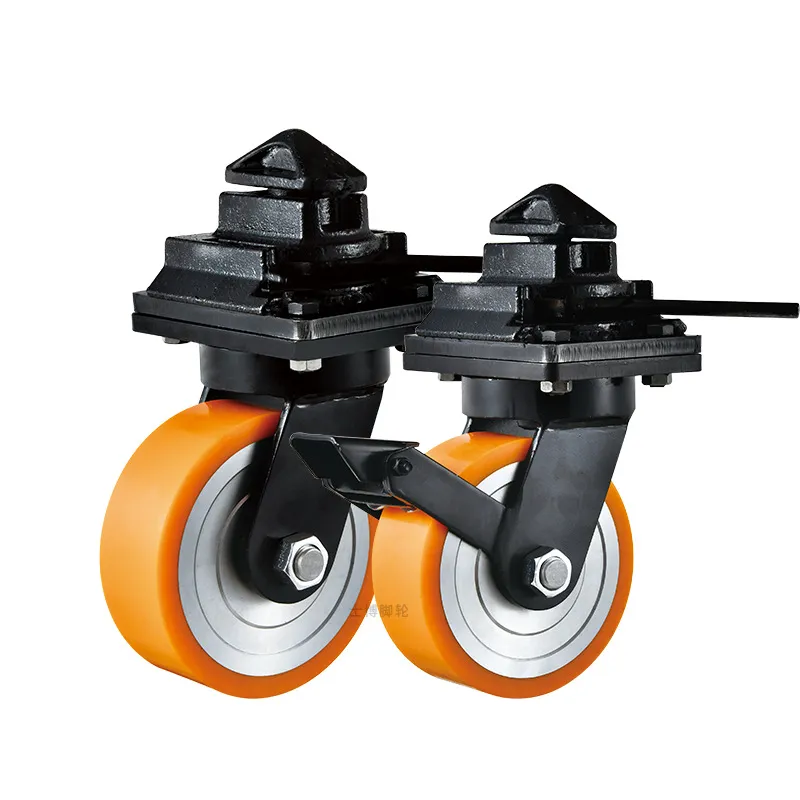
– Medical Equipment: Used on medical beds, trolleys, etc., to reduce noise and provide smooth movement.
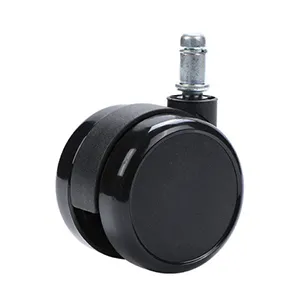
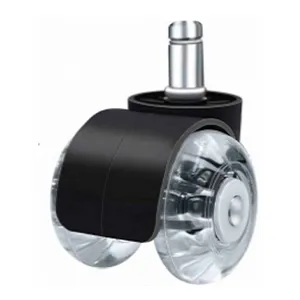
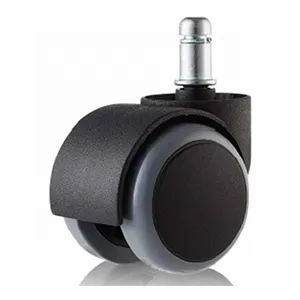
– Office and Home Furniture: Employed in office chairs, mobile cabinets, etc., providing a light, quiet, and floor-friendly mobility solution.
Types of Polyurethane Casters
بولكاستر produces hundreds of types of polyurethane casters. Common types include light-duty polyurethane wheels, heavy-duty polyurethane wheels, plastic-core polyurethane wheels, iron-core polyurethane wheels, furniture wheels، و shock-absorbing polyurethane wheels. You can explore our polyurethane caster product series or contact us for a catalog.
Manufacturing Process of Polyurethane Caster Wheels
The manufacturing of polyurethane casters is a precise and technology-intensive process involving multiple steps to ensure the quality and performance of the final product:
– Raw Material Preparation: Production of polyurethane casters begins with high-quality raw materials, including isocyanates, polyols, and catalysts.
– Prepolymer Preparation: Isocyanates and a part of the polyols are mixed to form a prepolymer, preparing for the polymerization reaction.
– Mold Manufacturing and Preparation: Molds are precisely manufactured and prepared based on the size and shape requirements of the casters.
– Casting and Polymerization: The prepolymer is mixed with the remaining polyols and catalysts and cast into the mold under strictly controlled conditions to undergo polymerization.
– Post-Processing: After the caster is formed, it undergoes hardening, mold removal, and post-treatment to ensure the precision of the product’s dimensions and surface quality.
Challenges and Future Development
Although polyurethane casters excel in many aspects, they also face challenges in practical applications:
– Environmental Adaptability: In extreme temperatures or chemical environments, polyurethane casters may require special formulations to maintain their performance.
– Material Innovation: As application demands diversify, the performance requirements for polyurethane materials continue to rise. In response to these challenges, future trends may include:
– Material Research and Development: Developing more durable and environmentally adaptable polyurethane materials.
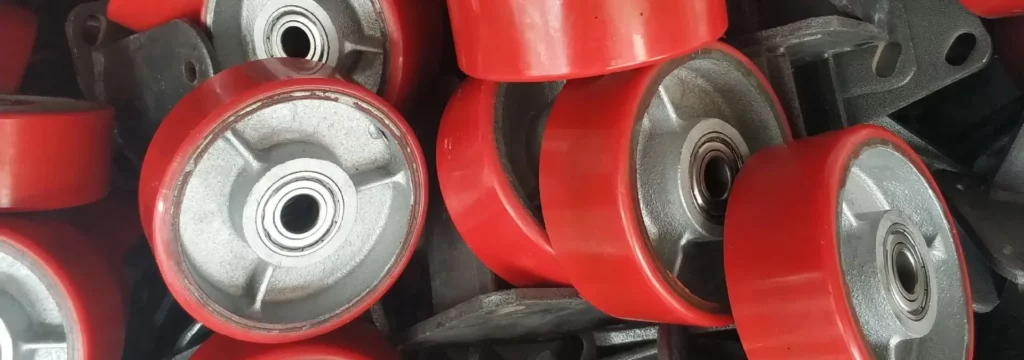
– Manufacturing Technology Innovation: Utilizing advanced manufacturing technologies, such as 3D printing, to reduce production costs and enhance efficiency.
– Sustainable Development: Developing recyclable polyurethane casters to reduce environmental impact.
PU Caster Wheels FAQ
Yes, polyurethane wheels are well-suited for outdoor use. They offer excellent resistance to wear, chemicals, and varying weather conditions. The durability and strength of polyurethane make these wheels capable of handling rough and uneven outdoor surfaces while providing a smooth ride. Furthermore, their resistance to water, oil, and many solvents adds to their suitability for outdoor environments, making them a reliable choice for various applications.
Yes. Polyurethane wheels are excellent due to their durability, high load-bearing capacity, floor protection, noise reduction, and chemical resistance, making them versatile for both indoor and outdoor applications.
Polyurethane wheels are generally floor-friendly and are known for not marking or damaging surfaces. However, it’s always best to assess the specific type of polyurethane wheel and the flooring material to ensure compatibility, especially on sensitive flooring surfaces, For example, we do not recommend using PU casters on carpeted floors.
Polyurethane wheels are relatively low-maintenance. Regular inspections to check for wear and tear, proper cleaning, and ensuring that they are free from debris will typically suffice in maintaining their functionality and extending their lifespan.
خاتمة
As a high-performance component in industry and daily life, polyurethane casters, with their wear resistance, chemical resistance, high load-bearing capacity, and wide application scenarios, have become the preferred choice in many fields. In the future, as materials and caster manufacturing technologies advance, the performance of polyurethane casters will be further optimized, and their application scope will be expanded, offering users more efficient, reliable, and eco-friendly solutions.
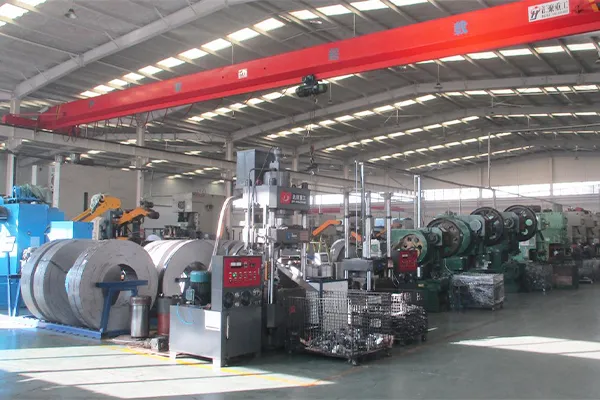
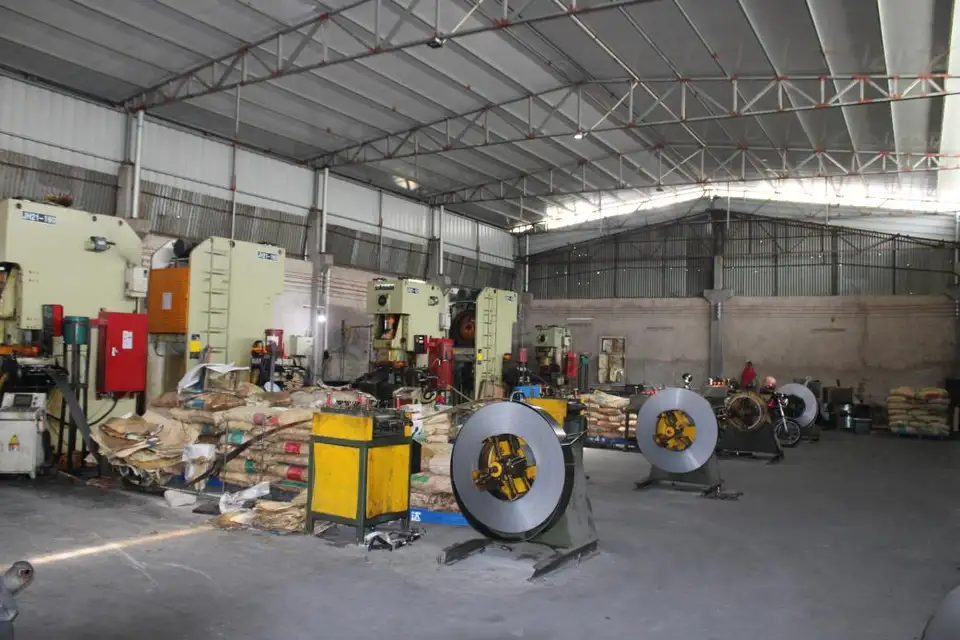
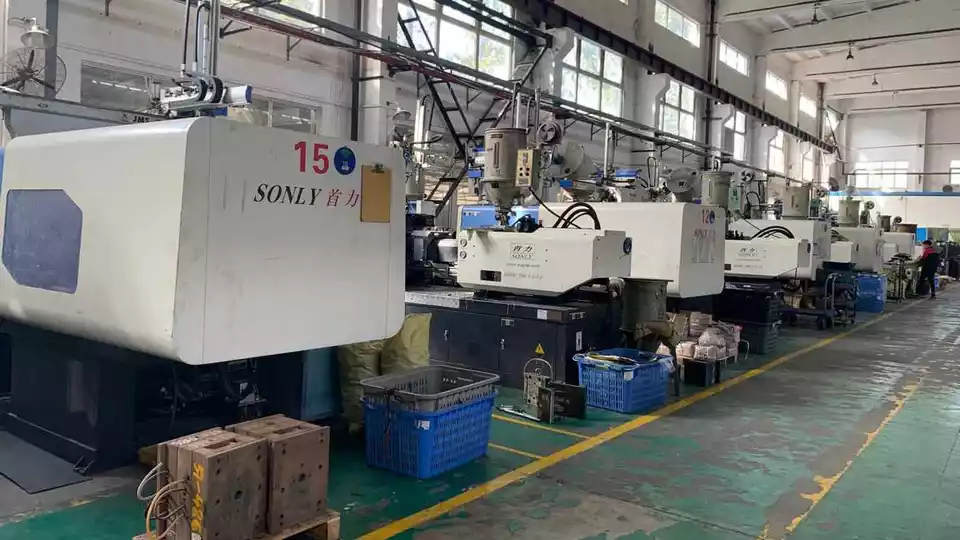
When selecting polyurethane casters, it is advisable to collaborate with experienced and reputable manufacturers to ensure product quality and performance meet specific application needs. Bullcaster, with over a decade of experience in producing polyurethane casters, we’re a pu caster wheel manufacturer in China. we can provide you with high-quality polyurethane casters and customization services. Contact us for a quote on our casters.


